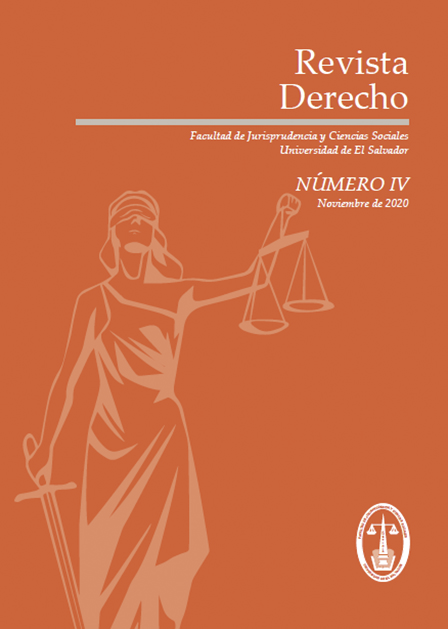Historical - legal study of the political participation of wom-en in Central America at the level of local governments with emphasis in the election of mayors
Keywords:
Fee, Participation, Political Parties, Suffrage, Constitution, MayorsAbstract
The article briefly and precisely describes the background of the vote for women in the Central American region, how it was obtained recognition of that fundamental right, what were the historical causes that led to its obtaining, the first women to actively participate in the policy of each of their countries and the regulatory bodies where the different modalities of voting for women were established. A comparative investigation is proposed, in which the similarities, differences and high and low indices regarding the participation of women in local powers in each of the countries of Central America are reflected. The topics to be compared are the historical evolution of women’s social and political participation, starting at the point where they play an important role in making changes in favor of their partici-pation rights; attaining from these fights the recognition of the feminine suffrage, spending later, to the historical moment in that they began to exert public charges. Likewise, the current incidence and performance in several institutions of their respective political and regional systems will be described, to reflect on the scope they have managed to establish as part of society. The legal reforms implemented to guarantee these changes in the electoral sys-tem are explained. In addition, data are presented with a temporary delimitation from 1994 to 2018, for positions of local power - which are presented to compara-tively assess the level of participation of women before and after the Political Parties Law entered into force, and how that has impacted on the level of participation of women in politics, particularly the case of El Salvador.
Downloads
References
“La primera abogada”, El nuevo diario, Nicaragua, 16 de julio 2013. http://www.elnuevodiario.com.ni/opinion/291733-primera-abogada/
Ana I. García y Enrique Gomáriz, Mujeres Centroamericanas (FLACSO Andes, San José, 1989) 193-221.
Código Civil de la República del Salvador en Centro América (El Salvador: Decreto Ejecutivo, 1860).
Código Electoral, 2009, Decreto legislativo no 8765 expediente no 14.268, artículos 2 y 52.
Código Electoral, Decreto no 413 Diario Oficial No.: 138 Tomo No.: 400 (El Salvador: Asamblea Legislativa, 2013).
Constitución de la Republica de El Salvador (El Salvador: Asamblea Nacional Constituyente, 1939)
Delia M. Ferreira Rubio, La participación política de las mujeres en Honduras: el camino del reconocimiento de derechos a la presencia efectiva (International Foundation for Electoral Systems, 2013), 4-5 https://www.ifes.org/sites/default/files/womenspoliticalparticipationinhonduras.pdf
Eugenia Rodríguez S., Las luchas por la ciudadanía femenina en costa rica (1890-1953) Escuela de historia, (Universidad de Costa Rica, 2005). https://revistas.ucr.ac.cr/index.php/dialogos/article/download/6255/5957/
Honduras, Decretos de la Asamblea Nacional Constituyente, 1957 (Tegucigalpa: Tipografía Nacional, SF).
ISDEMU, El hilo de las Mujeres en la Participación Política Ciudadana en El Salvador (San Salvador: (ISDEMU, 2013), 71.
Jorge Lujan Muñoz. Breve Historia Contemporánea de Guatemala (Fondo de Cultura Económica, Cuarta edición, México, 2012).
La Gaceta, Diario Oficial de la Republica de Honduras, 21 de agosto de 1957.
Ley de Partidos Políticos, Decreto no 307 Diario Oficial No.: 40 Tomo No.: 398 (El Salvador: Asamblea Legislativa, 2013).
Marcio A. Barrientos, Conquista al derecho al voto (Presencia Universitaria, 2015). https://presencia.unah.edu.hn/noticias/la-conquista-del-derecho-al-voto/
María Candelaria Navas, “Movimiento de mujeres en El Salvador: desde su invisibilidad histórica hasta los estudios de género”, Realidad y Reflexión, 2009. http://ri.ufg.edu.sv/jspui/bitstream/11592/123/1/Movimiento%20de%20mujeres%20en%20El%20Salvador.pdf
María Candelaria Navas, Sufragismo y Feminismo, visibilizando el protagonismo de las mujeres salvadoreñas, Consejo de Investigaciones científicas (El Salvador: Editorial Universitaria, 2012), 28 y 29.
María Candelaria Navas. Breve recorrido histórico de la participación de las mujeres en El Salvador (El Salvador: Foro “Construyendo Ciudadanía desde las Mujeres, FUNDE). http://www.repo.funde.org/921/3/APD-105-Art1.pdf39
María D. Álvarez, El voto de la mujer en Nicaragua (Antropología Nicaragüense, 2007). http://antropologia-nica.blogspot.com/2007/03/el-voto-de-la-mujer-en-nicaragua-maria.html
María El. Masis, “El voto femenino en la democracia costarricense”, Boletín del Museo Nacional de Costa Rica, 2013. http://www.museocostarica.go.cr/boletin/entrevistas/59-voto-femenino.html#sthash.SaHwKM5F.4fUpUGBN.dpbs
María Eugenia Rodríguez, Movimiento de mujeres, feminismo y sufragismo en américa central 1900-1960., Escuela de historia (Costa Rica: Universidad de Costa Rica, Mimeo, 2002).
Rosario Montenegro, “El voto femenino en Nicaragua: una historia oculta”, Avances investigativos (marzo 2012). 92-115. https://www.researchgate.net/publication/265490897_El_voto_femenino_en_Nicaragua_una_historia_oculta
Sergio Bahr, Breve aporte a la historia del Movimiento de Mujeres de Honduras (WordPress, 2010). https://sergiobahr.wordpress.com/2010/07/17/breve-aporte-a-la-historia-del-movimiento-de-mujeres-de-honduras/
Simone de Beauvoir, Para una moral de la ambigüedad, (Francia: Editorial Gallimard, 1947).
Tribunal Supremo de Elecciones, Republica de Costa Rica, Marta E. Solano, “A 90 años de la fundación de la Liga feminista costarricense: los derechos políticos”, Revista Derecho Electoral, N.° 17, enero-junio (2014).
Downloads
Published
Issue
Section
License
Copyright (c) 2020 Revista Derecho

This work is licensed under a Creative Commons Attribution-NonCommercial 4.0 International License.
The authors transfer the copyright rights in favor of the Faculty of Jurisprudence and Social Sciences of the University of El Salvador (through Aequus Editorial) to include their writing in Revista Derecho.








